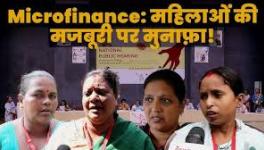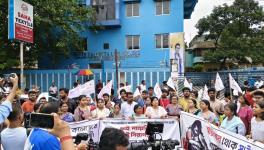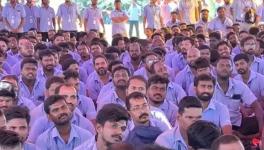The Little Discussed Tamil Nadu’s Policy for Women
The Department of Social Welfare and Women Empowerment in Tamil Nadu released a draft policy for women on December 15 that aims to provide a safe, secure, healthy and aspirational environment to empower the 3.2 crore women population in the State, through an operational convergence amongst departments.
The draft policy contains aspects such as the need to address the widening sex ratio, a survey to estimate the gender inequality in household work, social protection measures for single women headed and deprived families, leave during menopause for working women, and more.
However, there has been little discussion on the draft and that is partially because the document is available only in English. Although activists have demanded that it be translated into Tamil and uploaded on the website, the state has not made the effort.
Moreover, the last date to send in opinions and suggestions has lapsed, it was till January 31, 2022.
Earlier the state released the State Policy for Children in November 2021. These policies have largely been received well, but how far and how well they would be implemented is the concern.
WHY IS WORLD BANK INVOLVED?
Institutions of the United Nations were closely involved in the drafting of the policy for women. Representatives from the World Bank and UN Women were part of the meetings held along with members of the State Planning Commission, social activists, elected representatives and others.
U Vasugi, leader of the AIDWA, told NewsClick “they have mentioned the World Bank as a member of the high-level committee (HLC). We think only the government and stakeholders must be part of it. There is no explanation as to why the WB comes in and in what capacity”.
The HLC is formed to overlook the implementation of the policy.
The World Bank has been involved in framing other policies in the state as well, especially the recent policy on Resettlement and Rehabilitation, which is vastly criticised for being favourable towards commercial expansion at the expense of evicting poor families out of the city.
The response of the CPI(M)’s state committee to the draft policy for women read “Women are the main victims of such evictions. Their security and housing needs should be made an integral part of this policy”.
MORE ACCESS TO CREDIT
The draft policy stresses the need for enhanced institutional credit access for women in need through the establishment of Women’s Bank.
The culture of women taking small loans, especially by pawning gold, to run their household, for education and other routine consumption needs is widely prevalent in Tamil Nadu and it increased in the COVID-19 pandemic.
Women are pushed to take loans not only because of underemployment and low income but also due to the widely prevalent alcoholism, by which the state corporation TASMAC takes away a large part of the income of men.
Vasugi said “When institutional loans with nominal interest are not in place, women are forced to approach microfinance institutions for usurious interest rates because they are easy to get. But MFIs system of recovery is plain cruelty. Even during Covid, when RBI repeatedly stated that interest on interest should not be collected and it proposed moratorium on recovery, MFIs used extra-legal methods…”
AIDWA has been demanding strict action against microfinance institutions that harass women who were unable to repay loans due to lack of income during the COVID-19 lockdown.
She further added, “Tamil Badu government can learn from Kerala's kudumbashree project in this regard”.
The CPI(M)’s response to the draft policy stated that sufficient stress was not given to the problem of alcoholism in the state. It demanded the policy to include the need for alcoholism treatment centres and the gradual reduction of liquor stores.
STATE MUST SUPPORT AS MARKET FAILS
The COVID-19 induced pandemic exposed the failure of the free market economy in sustaining the lives of the downtrodden. The State and civil society organisations came to the rescue to ensure that people did not die out of hunger.
Cut across all categories, women are part of the most exploited and most socially oppressed sections, and were most affected by the pandemic and the lockdown.
Vasugi said, “The combination of casteism, communalism and patriarchy act as a dangerous mix on gender, we need a separate policy for women which encompasses all these aspects of reality”.
She further added “We feel the elected government has a concrete role to play in the upliftment of women. Everything cannot be left to the whims of the market. When the Central government goes more and more in the direction of the pro-corporate path, the State governments at least should play a role. It could be in the form of apportioning funds, budgetary allocations, planning etc with a gender-sensitive approach”.
Get the latest reports & analysis with people's perspective on Protests, movements & deep analytical videos, discussions of the current affairs in your Telegram app. Subscribe to NewsClick's Telegram channel & get Real-Time updates on stories, as they get published on our website.
























